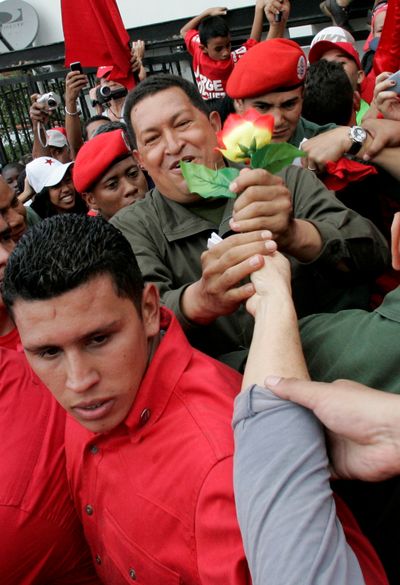Chavez’s ambition on line Sunday
Venezuelans to decide term limits’ future

CARACAS, Venezuela – In a vote with huge ramifications, Venezuelans will decide Sunday whether to give President Hugo Chavez the chance to remain in power indefinitely.
Approving Chavez’s proposal to scrap term limits would give fresh momentum to his socialist revolution. Defeating the measure would weaken his political legitimacy, undermining his grand ambitions at home and abroad.
Polls indicate that the result is too close to call, although Chavez seems a slight favorite since he’s marshaled the entire machinery of government behind his bid to keep power past the scheduled end of his term in 2013.
Undecided Venezuelans such as Jesus Infante, a 23-year-old clothing store salesman, will spell the difference.
“Chavez has done a lot of good things for the poor, but I don’t like how he is always getting into fights with other foreign leaders,” Infante said. “I haven’t heard a convincing argument yet by either side.”
Chavez has become a 21st century populist strongman during his 10 years as president.
He has used a windfall from high oil prices to shower billions of dollars on Venezuela’s downtrodden while managing the economy and marginalizing his critics.
Chavez also has forged an anti-U.S. bloc, sending billions of dollars to Cuba, Bolivia and other like-minded nations in Latin America that oppose free trade and capitalism.
Sunday’s election is being closely watched from Washington to Havana to Brasilia.
“What happens in Venezuela will affect what happens in Bolivia, El Salvador, Peru, Nicaragua, Ecuador, Guatemala, Argentina and elsewhere in the hemisphere,” said Jorge Quiroga, a former Bolivian president and a Chavez critic, in an interview. “You can plot the matrix: The stronger Chavez is at home, the more meddlesome he is abroad.”
Chavez’s behavior in Venezuela and beyond worries U.S. policymakers. Since the U.S. buys most of Venezuela’s oil, however, American consumers ironically have been financing a good portion of his government’s anti-U.S. activities.
Chavez is trying to join two leftist allies – Ecuador’s Rafael Correa and Bolivia’s Evo Morales – in winning public approval to extend his time in office.
This is Chavez’s second attempt to be given the right to remain in power as long as he wins elections. In December 2007, Venezuelans narrowly defeated his first campaign, which sought 69 changes to the constitution. It was the only national election that he has lost.
Analysts think that Chavez is holding the latest referendum now because he thinks that his popularity is about to wane as the Venezuelan economy gets pummeled by low global oil prices, the U.S. economic slowdown and rising prices within Venezuela.
Asdrubal Oliveros, a Caracas-based economic consultant, predicts stagflation in 2009. He expects that growth will drop from 4.9 percent in 2008 to 0.5 percent in 2009 while inflation will rise from 31 percent to 40 percent.
The referendum asks voters to mark “si” or “no” whether they favor abolishing term limits not only for Chavez but all elected officials.